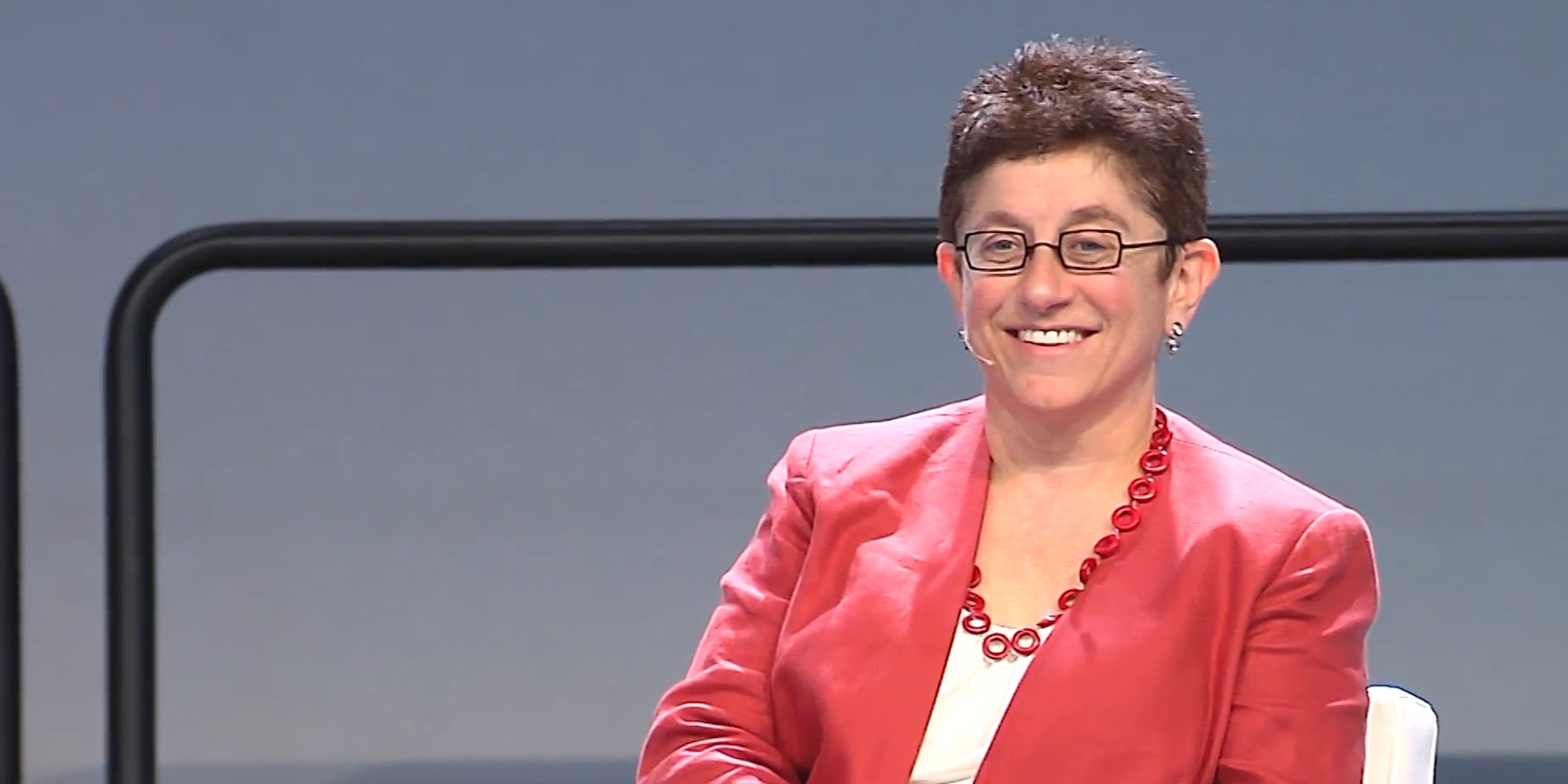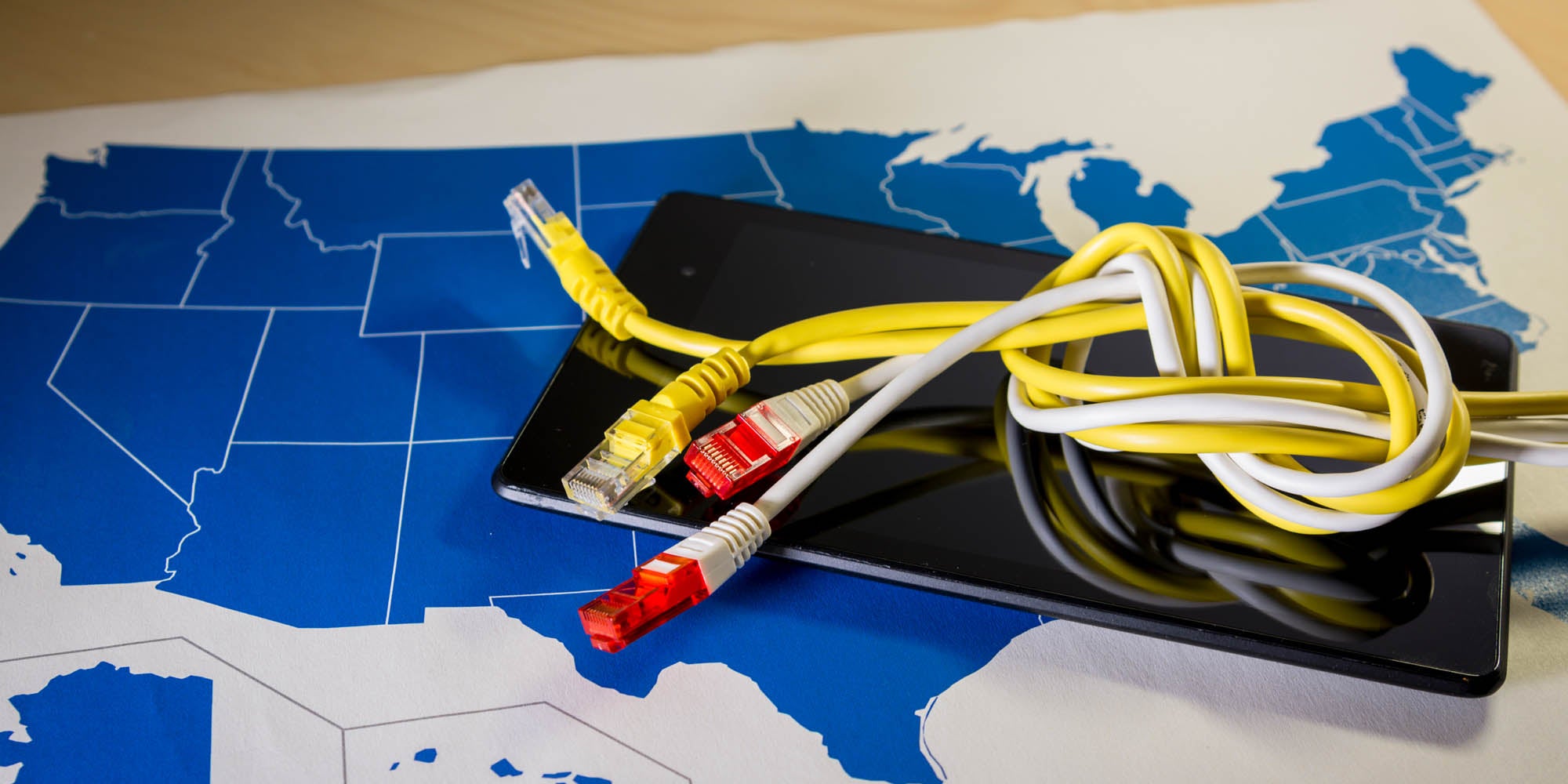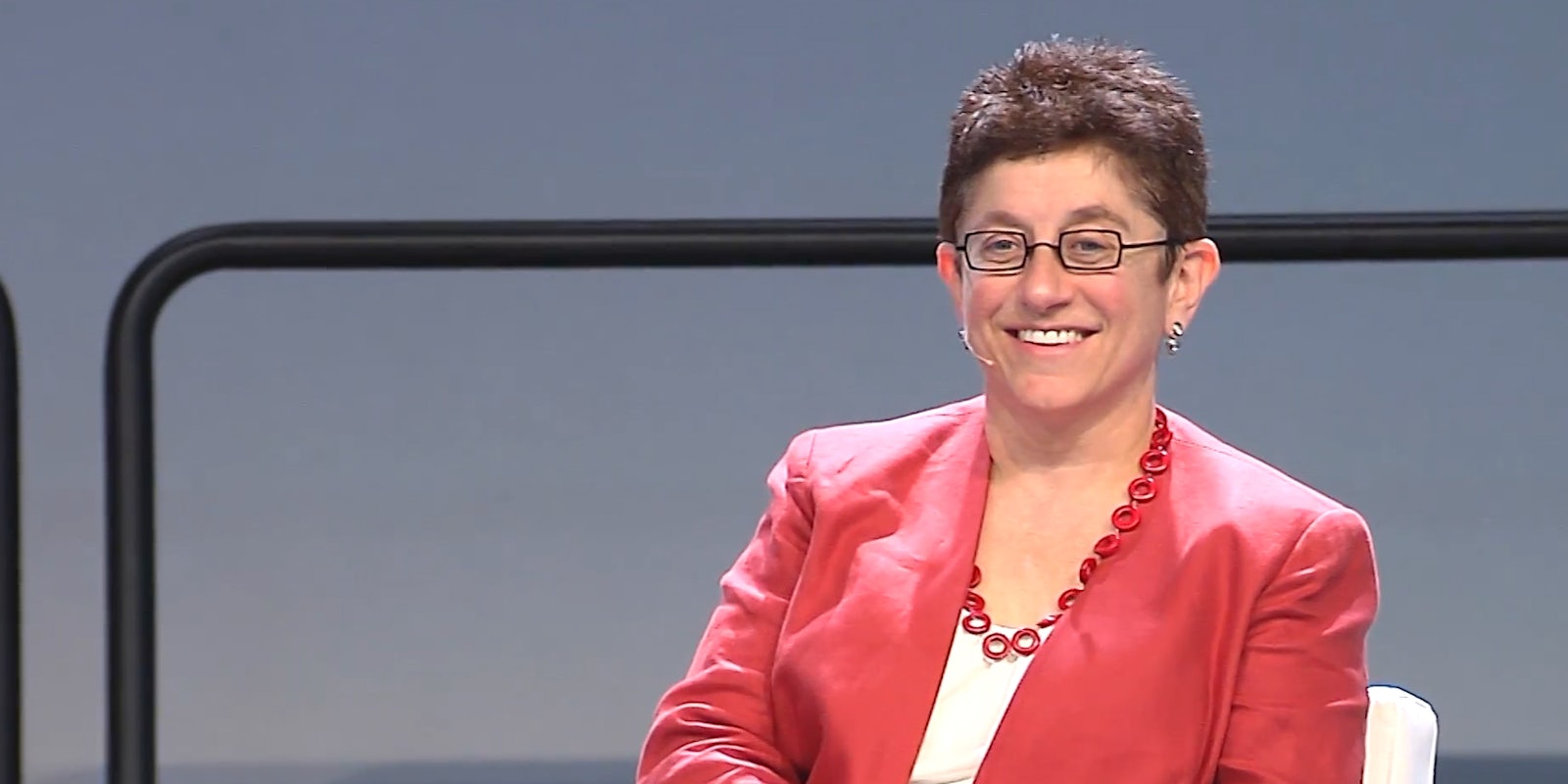Sign up to receive the best of the internet straight to your inbox.
Welcome to the Tuesday edition of Internet Insider, where we dissect tech and politics unfolding online. Today:
- We talk to Gigi Sohn, a distinguished fellow at the Georgetown Law Institute for Technology Law & Policy, a Benton Senior Fellow & Public Advocate, and former FCC counselor, about the latest movement regarding net neutrality rules, the digital divide, and more.
- Sohn is a long-time advocate for net neutrality and co-founded Public Knowledge. Sohn’s name has also recently been part of speculation as a potential pick for President Joe Biden to fill out the FCC.
- Below is a conversation between Deputy Tech Editor Andrew Wyrich and Sohn. This is an expanded conversation from the one in today’s newsletter. It has been edited for length and clarity. Relevant links have been added throughout for more context.

BREAK THE INTERNET
Q&A: Gigi Sohn on net neutrality, digital divide, more
Andrew: I thought we could start with net neutrality. It’s long been assumed that Biden, if he was elected, would have a Democratic FCC who would bring back the rules, and there have been some signs recently that it does look like that is going to happen in some form or another. Sen. Ed Markey just said it was a “new era” for net neutrality. Do you agree?
Gigi: I absolutely agree, net neutrality is coming back one way or another and I think the way it will first come back is through the FCC when there’s a full complement of commissioners. That’s the big thing we are waiting for, obviously.
But not to beat a dead horse, the first thing that needs to come back before net neutrality comes back is FCC authority. The courts have told us you can’t have real net neutrality unless the agency has Title II authority. So that’s the first thing the FCC has to do. That of course gives them not only the power to adopt new net neutrality rules, it gives them the power to adopt new privacy rules if they want to.
When I was at the FCC we adopted very strong privacy rules for broadband providers. Congress repealed them using the Congressional Review Act. Well, we’re not allowed to bring back the same rules or substantially similar rules, but we could bring back stronger rules. We could do that. We could go after fraudulent billing, we could go after price gouging. I think, very importantly for closing the digital divide, it puts our authority to strengthen Lifeline, to make improvements to the High Cost Fund, it puts it on firmer legal ground. I think people don’t realize that.
I think people don’t always understand. The Communications Act says that Lifeline funds and funds for the High Cost Fund will go to telecommunications services. Well, right now, broadband providers are not telecommunications services under Title II.
So if somebody wanted to challenge that in court, they’d probably win. What the FCC would be doing by reclassifying—saying broadband is a telecommunications service, not an information service—is basically strengthen the legal ground for giving subsidies for poor people and our broadband infrastructure.
Andrew: It does feel like part of the net neutrality debate kind of papers over the authority aspect because blocking, throttling, paid prioritization—and in some cases zero rating—is kind of the big headline-grabbing thing. What kind of authority right now under Title II would be beneficial for the FCC? Also, how important would have that authority been during the pandemic?
Gigi: “Papers over it” is being kind. I think it’s purposefully left out of the conversation, particularly by those that don’t want it reinstated.
You can largely say, “Well, no blocking, no throttling, no paid prioritization. We really haven’t done that.” And, there are some instances here and there where they have done it, but for the most part, yeah, you haven’t done it.
Of course, everybody’s on their best behavior because California’s law is being challenged in the courts—they just appealed the California lower court’s decision; the Mozilla case is still an open case, the court remanded several parts of the Mozilla decision back to the FCC to decide how can you continue to do Lifeline—like I said—if you don’t Title II, how can you continue to protect public safety? So, you have all this litigation still open, so everyone’s on their best behavior.
But even if we didn’t have that, and the ISPs were behaving, it still doesn’t address the authority question. So it’s purposefully left out, I think you’re being kind.
Why would it have been important during the pandemic for the FCC to have authority? Because without that authority, the chairman was left with one option to make sure that people that people didn’t get kicked off their broadband or didn’t get subject to strict data caps. And that was to beg the companies not to do this, which 800 of them for about three months said ‘sure we’ll open up our Wi-Fi hotspots, we won’t kick people off or charge them late fees.’ That was part of the Keep Americans Connected pledge.
On June 30th, they’re all like ‘ok, no sorry, we’re going to go back to what we were doing before.’ So he had no ability to essentially demand that the companies not kick off people for failure to pay or charge late fees. It was all voluntary. The data caps were not part of the Keep Americans Connected pledge. You had the pledge the companies signed up for, and on top of that, the chairman asked the companies, again just as a pretty please, relax your data caps and adopt a low cost service if you don’t already have one and/or expand what you’ve got. A handful of them did that, but there was no ability to actually say ‘we’re in the middle of a national crisis, you will do that.’

SPONSORED
Guard yourself against COVID-19 variants
After an early round of studies, the CDC has confirmed two COVID strains identified in California as “variants of concern.” These strains are showing signs of being about 20% more transmissible, even though more study is needed for this to be conclusive. It’s a scary thought to think about after so many vaccines have been administered and it seems like an end might be in sight. But it also reinforces that wearing a mask is a radically necessary act.
We founded The Mask Up Project knowing that misinformation and confusion about masks could stand in the way of saving lives. That’s why our non-profit’s goal is to get masks into the hands of people bravely fighting this pandemic on the front lines. To do that, we also have to raise our voices and help the message be known: that small piece of fabric you loop over your ears not only protects your life, but that of every person you come into contact with. Learn how you can be a part of the solution at MaskUp.org.

Q&A CONTINUED
Andrew: We’ve also spoken about how important a net neutrality bill would be. There’s kind of two roads at the same time: the FCC and Congress. Markey has alluded to it recently. What would you say the chances of a bill actually making it Biden’s desk are?
Gigi: It depends. California is obviously the big one, right, that sets the national standard. You have the FCC going back to Title II, but we don’t know if the FCC is going to just readopt what we did in 2015 or they may make the rules stronger, or they may forbear from less.
I’m hoping there comes a point where the industry says ‘Oh boy, we better cut our losses’ and get a bill in Congress. That would not just only be net neutrality, but would also include undeniable, inarguable, authority over broadband. Unquestionable: One where they can’t go to court and say a Republican FCC can change its mind.
I think it’s important for that law to have explicit authority, and I hope it would be broad, but also expressly give the FCC the ability to adopt net neutrality rules or lay out what the rules should be. It is important for a court to say ‘the commission has the authority to regulate the network management practices of broadband ISPs.’
You especially want it because Justice Kavanaugh believes that the only way net neutrality is constitutional is if Congress tells the FCC to do it.
Andrew: I think there’s a lot of questions as to whether a bill would pass considering the need for 60 votes and Sen. Kyrsten Sinema being one Democrat who hasn’t expressly supported the Save the Internet Act, which I’m assuming is probably what Markey would be reintroducing. There’s a lot of smoke, and I’m wondering when we’ll really start seeing some fire?
Gigi: The first flame will be lit when we have a full complement of FCC commissioners. That will be the first start. Again, the California litigation will make its way through the 9th Circuit.
First of all, we don’t know if the filibuster rules are going to stay 60, they may become 55. And remember, all three [Republican] votes for the CRA? All three of them are still there. And there’s some new Republicans, so who knows? Depending on the political whims, and if industry says ‘We don’t want the patchwork. We’ve got Title II here, we’ve got California here. What do we do? Give us a law.’ If industry starts comes around, then more Republicans come around, and perhaps Sinema comes around.
I’m not willing to just say because of what has happened over the last decade, there’s no way you could get a law. I think things have changed enormously.
Andrew: And you’d think maybe more senators have realized the importance of broadband and broadband related laws considering the last year we’ve lived in.
Gigi: That’s the other thing right? My Republican colleagues will tell you I’m always whipping them on authority. If you reduce this debate to no blocking, no throttling, no paid prioritization, you’re not going to get there with your opponents. But if you say ‘so you don’t really want the FCC to be able to give out any more money for broadband infrastructure in your the rural parts of your state or in your entire state?’ Well then, see ya later!
We’ve got to convince people this debate is about much more than the bright line rules. That’s why when you see industry talking points, it studiously avoids the question of authority.
Andrew: Let’s talk about the digital divide. Both sides of the aisle have talked about closing the digital divide for years now. Are you optimistic about the digital divide and homework gap shrinking under a Democratic FCC?
Gigi: I am, but they can only do so much. I expect that under a Democratic FCC that E-Rate money—the money for schools and libraries—will go to home connectivity for K-12 students. I expect under a majority Democratic FCC that they will fix the problems with Lifeline and hopefully expand the subsidy. I also expect this FCC will promote competition, for example by getting rid of exclusives for cable operators in what we call ‘multi-tenant environments,’ otherwise known as condos and apartment buildings. Thirty percent of the American public lives in MTEs. Imagine if they had a choice?
So those are some of the things the FCC can do, and they must do. But it’s also going to take a big bet from Congress on infrastructure and affordability.
The Assessable, Affordable Internet For All Act, for me, is really like the dream bill in a lot of ways because it provides $80 billion for infrastructure, it provides money for folks in states and cities who are helping people get online, it gets rid of the state prohibitions on communities building their own broadband networks, it preferences scalable future-proof technologies like fiber, it also preferences open access networks.
Those are networks that a lot of communities are building just the middle mile—the connection between the last mile to your home and the internet backbone. They are making that middle mile available to any ISP that wants to provide service. So a lot of communities don’t want to be an ISPs. It’s a pain, or they don’t necessarily have the expertise—some do, particularly Chattanooga and other places where they have expertise in already being a utility. These networks basically say ‘come one come all.’ One example of these networks is UTOPIA in Utah where most residents have a choice of 10 different ISPs. They have it in other places, they have it in Holly Springs, North Carolina, they have it in Columbus, Ohio. It’s kind of a new trend in municipal broadband and this bill would give preference to those saying we’re going to do an Open Access Network.
Something else this bill does is say if you get government money to build, then you have to provide a 50 symmetrical $10 a month service. There’s a lot of good stuff in there.
What it doesn’t have, which it had last year, was it would have made the Emergency Broadband Benefit permanent. That’s the $50 a year or $75 a year for tribal lands. It was pulled for a variety of reasons. Number one: advocates for the poor are very concerned about having to go hat in hand to Congress every year to ask for the money.
The second concern is if you’re paying the ISPs $50 a year in perpetuity, what is the incentive to lower your prices? I get that. We have some of the highest broadband prices in the world and they’ll stay that way if the government is giving $50 to every person who can’t afford a connection. What’s the best way to make sure poor people can get robust broadband? Maybe it’s really the FCC really strengthening the Lifeline program—and I want to talk about that in a second. That may be the way to go. Or maybe you have some sort of more flexible broadband benefit that gets reviewed every year or every other year that is not permanently at the $50 level.
Municipal broadband is not for everybody. But it’s for a lot of towns and cities. And depending on how you’re counting, between 19 and 22 states don’t allow communities to either build their own or expand what they already have is outrageous. It’s anti-competitive and anti-consumer.
Is that alone going to solve the digital divide? Nothing alone is going to solve the digital divide. I think this is really important. It’s going to take all hands on deck from states, localities, philanthropy. There are parts of the federal government, not just the FCC, the NTIA, the Department of Education, the Department of Agriculture and Industry. It’s going to take all hands on deck.
The FCC definitely has the ability to make things better, but they don’t have the ability to fix it alone. It’s got to be an all hands on deck approach, and allowing every community that wants to build their own to do so is definitely part of that equation.
Andrew: You mentioned you wanted to talk about Lifeline.
Gigi: Lifeline, the High Cost Fund—when I say the High Cost Fund I’m talking about the Rural Digital Opportunities Fund, which is for wireline, and the 5G Mobility Fund, which is for wireless. The rural healthcare fund and E-Rate fund all come out of the Universal Service Fund. It’s a fund of about $10 billion dollars or so a year that the FCC manages that comes from a fee that rate payers who still get plain old telephone service, like me, pay for. (VOIP, and also wireless phone service is subject to the rate). The problem with that is the number of companies that pay into that kitty is shrinking, and shrinking, and shrinking.
So the FCC has got to do something about that. Right now the contribution rate is 33 percent. So 33 percent of those revenues are going to this fund. It’s not equitable. It’s unfair.
So you have to ask yourself, why aren’t broadband companies paying? I think you also have to ask the question should some of the big users like tech companies pay?
You have to ask those questions. Now look, if Congress figures out a good way of providing money for broadband affordability, maybe they also make E-Rate a yearly thing. Maybe the Universal Service Fund shrinks, but you’re always going to need the Universal Service Fund, for various reasons, not the least of which: in some rural areas where they’re serving a handful of people on a mountain, the companies will never make a profit. So they need operating expenses, not just capital expenses.
So even if this fund shrinks, it’s still not fair to spread the burden to a handful of companies. By the way, it will take a long time for Congress to resolve the affordability. It’s not going to happen tomorrow.
Universal Service contribution has long been the third rail, but now the fund is unsustainable. You can’t have contributions be 33 percent—that’s insane. It’s certainly not fair to poor people who actually still have telephone service.
Andrew: Given everything we’ve talked about, and what things are looking like right now, what are your feelings generally about the next few years and how they’ll play out in terms of technology and telecom policy?
I’m optimistic, but everything depends on leadership. Look, having somebody like Tim Wu in the White House—that’s fantastic, he’s doing both tech and telecom policy. If we have more appointments like that, my optimism is going to go through the roof.
I have no doubt that whoever is at the FCC or the FTC is going to be an improvement over Trump. That’s a no-brainer. The question for me is how bold is the leadership going to be?
I think, particularly given the state of the digital divide in this country, you have to have bold leadership, not just kind of status-quo what Democrats have done in the past. It hasn’t been enough.
I would say the same thing about tech policy, particularly with tech policy. The Obama administration, I think everybody admits, treated the big tech platforms with kid gloves and that can’t be the case anymore. I think it’s critically important for the Biden administration to pick people who are willing to go out on a limb.


